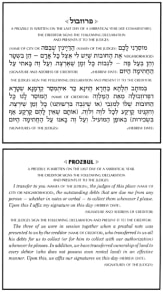I have a friend who owes me 1,000 dollars. He told me that once Rosh Hashanah comes, he will not have to pay me back. Is that true?
To answer we have to start from the beginning. The Torah says in Devarim (Chapter 15, verses 1-2) “at the end of seven years…every creditor should release his authority over what he lent his friend.”
The observance of Shemittah is not only resting the land of Israel, but also forgiving all debts. Any loan not paid at the conclusion of the Shemittah year is cancelled. This is referred to as Shemittas Kesafim.
The Torah continues: “beware lest there be an unfaithful thought, the seventh year is approaching and you will hold back from helping your needy brother and not give him… you should surely give him… G-d will bless you [15:9].”
How would someone lend money knowing that the loan will be wiped out?
The Talmud (Gittin 36 A) tells us that Hillel instituted a concept called Pruzbul. Rashi explains this is a hybrid word meaning pruz, an enactment, bol, the wealthy and butei, the poor. (Rashbam in Talmud Bava Basra 65 B explains that pruz comes from the word to expand. In other words, Hillel instituted a method for the wealthy to protect their loans.)
Since the Torah says “your needy brother”, Hillel’s enactment transferred the loan from an individual to The Court- Beth Din. Such loans do not have to be cancelled [Shviis 10-2].
How could Hillel institute something that seems contrary to what the Torah wants? The Talmud gives two answers. 1) During the entire period of the second Bais Hamikdash, following the view of Rebbi, the laws of Shemittah were only applicable on a rabbinic level. Therefore, Hillel’s enactment was not revoking the Torah law of debt cancellation. Hillel was empowered to do so. 2) Others explain that it works through the concept of ‘Hefker Beth Din Hefker’, an ownerless declaration of the Beth Din.
What items are affected by Shemittas Kesafim?
The halachic authorities discuss that Shemittas Kesafim may include any item that is borrowed and replaced by another similar item. Credit offered for purchases and services are not affected by Shemittah [Shviis 10:1].
When do I make a Pruzbul?
Loans remain in effect until the end of the Shemittah year. Therefore, most have a custom to write a Pruzbul at the conclusion of the Shemittah year. Some will write a Pruzbul prior to the start of the Shemittah year, as there is an opinion which states the lender cannot demand payment once the year begins.
What is the exact procedure?
To begin, the lender asks three Torah-observant men to form a Beth Din that will give consent and bear witness to the creation of the Pruzbul. The lender proclaims before them: “I submit to you, judges in (name of city), all of the outstanding loans that are owed to me thereby allowing these debts to be collected at any time that I desire.” The lender then completes the Pruzbul form shown. The Pruzbul needs to be dated as it affects all loans prior to that date. If one makes a loan after that date, a new Pruzbul must be written.
A requirement for the ability to write a Pruzbul in the first place is that the borrower must own land. There is a disagreement  between Rambam and Rashi why this is necessary which is beyond the scope of this article. If the borrower does not own land, he should consult his local Orthodox Rabbi. Women must also write a Pruzbul if they have assets that are separate from their husbands. If the Pruzbul gets lost, it is not necessary to write a new one for the lender to collect his loan.
between Rambam and Rashi why this is necessary which is beyond the scope of this article. If the borrower does not own land, he should consult his local Orthodox Rabbi. Women must also write a Pruzbul if they have assets that are separate from their husbands. If the Pruzbul gets lost, it is not necessary to write a new one for the lender to collect his loan.
If a Pruzbul was not written, the lender must verbally release the borrower from the loan. If the borrower wants to settle the debt anyway, it is permitted, provided that he verbally stipulates that this transaction is a gift to the lender. If the borrower did not verbally express this intention, the lender can hint or have others prompt him to do so [Aruch Hashulchan C.M. 67:14].
As we approach Rosh Hashanah and beseech G-d for a year of health, wealth and everything good, it is essential to remember that it is He who grants each one of us our fortunes, and we are only lending out His money.
by Rabbi Moshe Zywica
Executive Rabbinic Coordinator
For more halachas of Pruzbul, click here.

